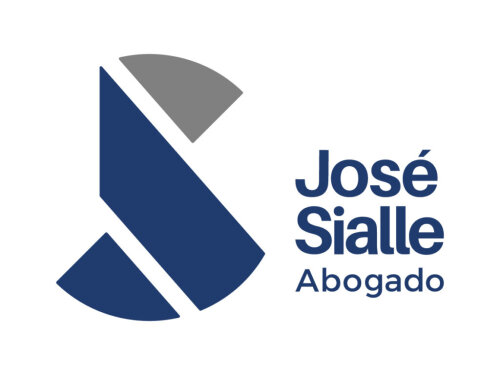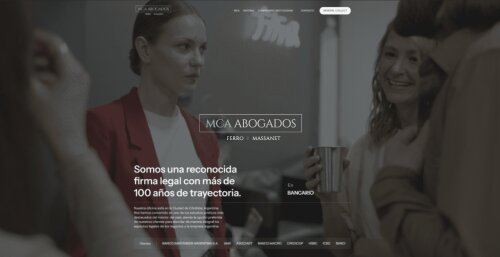Best Nonprofit & Charitable Organizations Lawyers in Córdoba
Share your needs with us, get contacted by law firms.
Free. Takes 2 min.
List of the best lawyers in Córdoba, Argentina
About Nonprofit & Charitable Organizations Law in Córdoba, Argentina
Nonprofit and charitable organizations in Córdoba operate within a mixed legal framework made up of national rules and provincial requirements. The national Civil and Commercial Code sets the basic legal forms and rules for entities without profit motive, while tax, registration and certain administrative obligations are handled through national and provincial authorities. In Córdoba, most organizations register with the provincial corporate registry and must comply with provincial regulations in addition to national tax and labor rules. Common legal forms are asociaciones civiles and fundaciones. Legal advice is often needed to choose the right form, draft statutes, register properly, obtain tax benefits, and maintain regulatory compliance.
Why You May Need a Lawyer
Nonprofit projects often look straightforward, but legal pitfalls can create risks for founders, board members and the organization itself. You may need a lawyer when you are forming a new organization, preparing or amending bylaws, registering with provincial or national authorities, applying for tax-exempt status, entering into contracts, hiring staff or formalizing volunteer programs, seeking public grants or private funding, accepting large or restricted donations, or winding up the organization. Lawyers help interpret applicable laws, draft and review governing documents, advise on tax and labor exposure, handle disputes and litigation, and design compliance systems that reduce the risk of penalties or loss of benefits.
Local Laws Overview
Legal framework - The national Civil and Commercial Code provides the general legal structure for associations and foundations, including rules on formation, governance and dissolution. Provincial rules add registration and reporting requirements that vary among provinces. In Córdoba, founders must engage with the provincial registry that supervises noncommercial legal persons.
Registration - Most nonprofits must register with the provincial inspection or registry for legal persons. Registration usually requires founding minutes, approved statutes, a list of founding members, and identification of the governing board.
Tax and fiscal obligations - To operate legally and receive donations, organizations must obtain a tax identification number (CUIT) from the national tax authority (AFIP). To obtain tax exemptions or reduced rates, organizations must meet criteria and follow application procedures set by AFIP and by the provincial tax authority. Different tax regimes apply to VAT, income tax and payroll contributions depending on activities and whether the entity qualifies as non-profit under applicable rules.
Labor and social security - If the nonprofit hires employees or engages long-term paid staff, it must comply with national labor law, register with social security agencies, and withhold and pay payroll taxes and social contributions. Distinguishing volunteers from employees requires careful documentation and correct practices.
Transparency and anti-money laundering - Nonprofits that receive significant donations, public funds or cross-border transfers should be aware of reporting obligations linked to anti-money laundering rules and beneficiary transparency. Authorities may require disclosure of ultimate beneficiaries or sources of funds in certain circumstances.
Data and privacy - Activities that collect, store or process personal data are subject to the national data protection law. Nonprofits must adopt appropriate data handling and privacy measures.
Contracts and public funding - Agreements with government bodies for subsidies or public programs typically include specific reporting, audit and procurement conditions. Breach of these terms can trigger sanctions, recovery of funds or contract termination.
Frequently Asked Questions
What legal forms can a nonprofit take in Córdoba?
The most common legal forms are asociaciones civiles and fundaciones. An asociación civil is based on a group of people organized around a shared purpose. A fundación is usually created by an initial patrimony dedicated to a social purpose and governed by a board. Choice of form affects governance, founding formalities and certain operational aspects. A lawyer can help you select the best structure for your goals.
How do I legally create an association or foundation in Córdoba?
Typical steps include drafting statutes that define purpose, governance rules and asset use; holding a founding assembly and recording minutes; preparing documents required by the provincial registry; and filing for formal registration. After registration you must obtain a CUIT from AFIP and register with provincial and municipal tax authorities as required. Exact documents and procedures vary, so local legal advice is important.
Can my organization receive tax-exempt status for donations?
Tax treatment depends on meeting administrative and substantive criteria set by AFIP and possibly provincial tax authorities. Some nonprofit activities are eligible for exemptions or reduced taxation, and donors may obtain tax benefits in some cases if the nonprofit is specifically recognized. Obtaining and keeping these benefits requires correct registration, transparent accounting and compliance with reporting obligations.
Do we need to register with both national and provincial authorities?
Yes. Registration with the provincial registry of legal persons is generally required to obtain legal personality under provincial rules. Separately, the organization must register with AFIP to obtain a CUIT and with provincial or municipal tax authorities for local tax matters. You may also need additional permits for fundraising or events at municipal level.
What rules govern volunteers versus paid staff?
Volunteers and paid workers are treated differently by law. Volunteers should be engaged under a clear policy or agreement that sets expectations, scope and liability. If a role resembles an employment relationship - with fixed hours, remuneration or employer control - labor and social security obligations apply. Misclassification can lead to back payments and penalties, so legal and payroll advice is advisable before hiring.
How should we handle donations with specific restrictions?
Donations with conditions or restrictions must be tracked and used in accordance with donor instructions and the organizations statutes. Restricted donations can create fiduciary duties and impose reporting requirements. Clear acceptance policies, designated accounting entries and donor acknowledgements reduce disputes and compliance risks.
What bookkeeping and audit rules apply to nonprofits?
Nonprofits must keep accurate books that reflect their activities and comply with accounting standards. Depending on size, funding sources and legal form, audits or external reviews may be required by funders or regulators. Public funding often carries specific accounting and reporting obligations. Consult an accountant familiar with nonprofit accounting in Córdoba.
How do we apply for public grants or municipal support?
Public grants usually require formal applications, submission of statutes and financial records, and compliance with procurement and accountability terms. Grants often include reporting and audit obligations. Make sure your governance structure, bank account and documentation are in order before applying.
What happens if there is a dispute among board members or with members?
Disputes may be resolved through internal mechanisms set out in the statutes, such as mediation, internal committees or membership votes. If internal remedies fail, disputes can lead to litigation before civil courts or supervisory authorities. A lawyer can advise on dispute resolution and represent the organization or individual members if litigation becomes necessary.
How do we dissolve the organization or transfer assets if needed?
Dissolution and asset disposition are governed by the statutes and applicable law. Typically dissolution requires board or membership approval, settlement of debts, and distribution of remaining assets according to the statutes and non-profit rules - often to another nonprofit with a similar purpose. Provincial registry formalities must be followed. Legal advice is important to ensure proper winding up and to avoid personal liability for directors.
Additional Resources
Inspección General de Personas Jurídicas de la Provincia de Córdoba - the provincial registry and supervisory body responsible for registration and oversight of noncommercial legal persons in Córdoba.
Administración Federal de Ingresos Públicos - AFIP - the national tax authority that issues CUITs and administers tax regimes and exemptions.
Dirección General de Rentas - Provincial tax authority of Córdoba - handles provincial tax registration, exemptions and local fiscal matters.
Unidad de Información Financiera - UIF - the national anti-money laundering authority that issues guidance and reporting obligations relevant to entities receiving funds.
Colegio de Abogados de la Provincia de Córdoba - local bar association where you can find lawyers with experience in nonprofit, administrative and fiscal law.
Administración Nacional de la Seguridad Social - ANSES - relevant for payroll, social security and employment registrations if you hire staff.
Local nonprofit networks and umbrella organizations - joining national or provincial NGO networks can provide practical guidance, training and peer support for governance and fundraising.
Accountants and auditors specializing in nonprofit accounting - an experienced accountant is essential for tax filings, audits and financial compliance specific to nonprofit rules.
Next Steps
1. Clarify your purpose and basic structure - decide whether an asociación civil or fundación best fits your objectives and prepare a draft of statutes and founding documents.
2. Consult a lawyer experienced in nonprofit law in Córdoba - bring your draft statutes, list of founders, planned activities and any funding sources. Ask about registration, tax-exempt status, labor issues and reporting obligations.
3. Engage an accountant - set up accounting and bookkeeping systems compatible with nonprofit reporting needs and funder requirements.
4. Complete formal registration - file with the provincial registry, obtain CUIT from AFIP, and register with provincial and municipal tax authorities as needed.
5. Put compliance in place - adopt policies for donations, conflicts of interest, data protection, volunteer management and financial controls. Ensure payroll and social security registrations are current for any paid staff.
6. Seek funding and operate - once registered and in compliance, open a bank account, prepare donor receipts, and proceed with fundraising and program delivery while maintaining transparent records.
If you have specific questions or a complex situation - litigation, large public grants, cross-border funding, or potential tax controversies - seek specialized legal advice early to limit risk and to protect the organization and its board members.
Lawzana helps you find the best lawyers and law firms in Córdoba through a curated and pre-screened list of qualified legal professionals. Our platform offers rankings and detailed profiles of attorneys and law firms, allowing you to compare based on practice areas, including Nonprofit & Charitable Organizations, experience, and client feedback.
Each profile includes a description of the firm's areas of practice, client reviews, team members and partners, year of establishment, spoken languages, office locations, contact information, social media presence, and any published articles or resources. Most firms on our platform speak English and are experienced in both local and international legal matters.
Get a quote from top-rated law firms in Córdoba, Argentina — quickly, securely, and without unnecessary hassle.
Disclaimer:
The information provided on this page is for general informational purposes only and does not constitute legal advice. While we strive to ensure the accuracy and relevance of the content, legal information may change over time, and interpretations of the law can vary. You should always consult with a qualified legal professional for advice specific to your situation.
We disclaim all liability for actions taken or not taken based on the content of this page. If you believe any information is incorrect or outdated, please contact us, and we will review and update it where appropriate.













